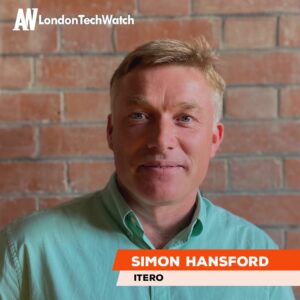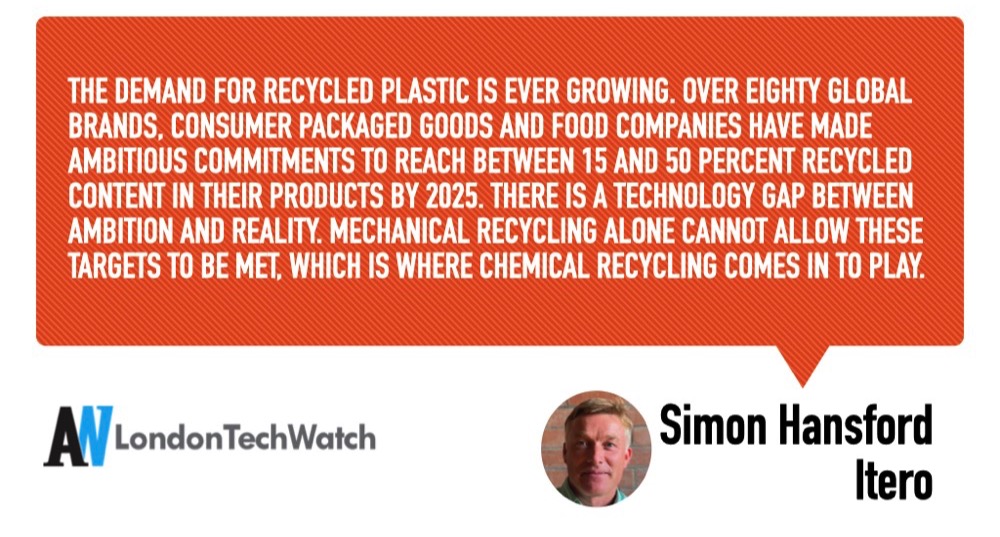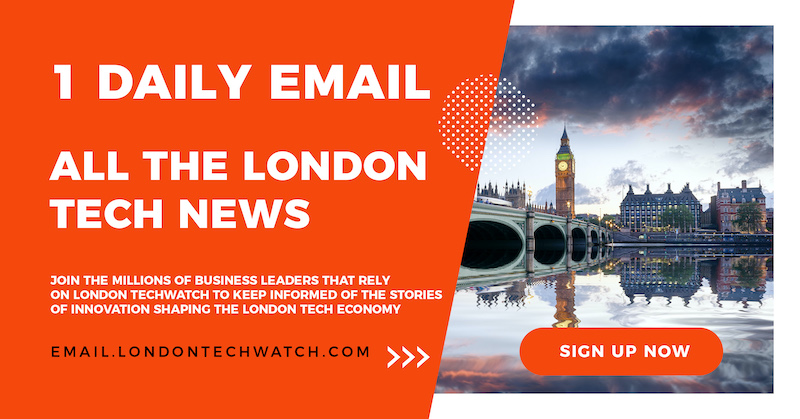The improper disposal of plastics is one of the most pressing environmental concerns that we face. There is exacerbated by the increased production of single-use disposable plastic products. Half of the plastics ever manufactured were in the last 15 years and 40% of this production is for single-use plastics that have led to a throw-away culture. Itero is a chemical recycling cleantech startup that uses technology to convert plastic to reusable raw materials for the production of new plastics. Rather than ending up in landfills and oceans, plastics can successfully be used in the circular economy through the company’s proprietary thermal conversion (pyrolysis) technology, leading to sustainability and reduced consumption of fossil fuels. Itero is currently piloting its technology at a recycling plant in the Netherlands that can handle up to 27,000 tonnes of residual plastic waste annually. This is equivalent to the plastic packaging waste generated in Amsterdam on an annual basis. Given the massive increase in the use and production of plastics globally, traditional recycling alone will not be enough to combat the crisis at hand; Itero paves the way for a tech-enabled solution that can be scaled.
London TechWatch caught up with Itero CEO Simon Hansford to learn more about the business, the company’s strategic plans, recent round of funding, and much, much more…
Who were your investors and how much did you raise?
This round could be described as Series A. We’ve successfully raised €6m in investments, with €5m from Infinity Recycling’s Circular Plastics Fund (CPF).
This investment is the continuation of a longstanding relationship between Itero and Infinity Recycling, a Rotterdam-based investment manager focused on helping promising advanced recycling companies with the upscaling and commercialisation of their technologies. The CPF is an Article 9 ‘dark green’ impact fund, the highest designation under the EU’s Sustainable Finance Disclosure Regulation (SFDR). Both Itero and Infinity are committed to driving ESG impact.
Tell us about your product or service.
Itero Technologies is a chemical recycling technology provider. Chemical recycling, which is a subset of advanced recycling, is a term used to describe a range of technologies that can convert plastic into raw materials for the production of polymers. Polymers are the building blocks for plastics.
The process we use, pyrolysis, converts plastic waste into high-value chemical products for the circular economy. This means we can simultaneously divert end-of-life plastics from landfill and incineration while reducing the consumption of crude oil. The chemical products are used as feedstock in the production of virgin-quality plastics, which can be retained again and again in the circular economy through the same process.
We currently operate our technology at our R&D Facility located near Heathrow, UK. This funding will support the development of our R&D facility, as well as the next phases of our first at-scale demonstration plant which will be at the Brightlands Chemelot Campus in the Netherlands. Our Demonstration plant in the Netherlands is due to start commissioning at the end of 2024. It will be able to process 27,000 tonnes of residual plastic waste annually, equivalent to the total amount of plastic packaging waste generated by the population of Amsterdam municipality per year.
 What inspired the start of Itero Technologies?
What inspired the start of Itero Technologies?
The technology and process Itero uses have been in development in various forms since 2010. In 2018 the company made the strategic decision to focus exclusively on the waste-plastic issue – adapting our technology processes to this. This decision coincided with the continued increase in demand for recycled plastics by consumers and businesses as well as the dramatic increase in public awareness around the issues surrounding plastic recycling and waste management, widely attributed to the ‘Attenborough’ effect.
How is it different?
Production of plastics is projected to triple by 2060 but existing recycling methods are limited in the types of plastics they can process and the quality of recycled products. Chemical recycling has fewer limitations – in the range of plastic waste processed and in the quality of the recycled products. McKinsey has forecast that by 2050 more than 30% of the global polymer (plastic) demand could be met through advanced recycling.
Our technology features include the ability to process a wide range of waste plastic feedstock, including various contaminants, owing to our technology heritage and market-leading scale, with large off-take volumes aligned with industry requirements.
What market you are targeting and how big is it?
The demand for recycled plastic is ever-growing. Over eighty global brands, consumer packaged goods, and food companies have made ambitious commitments to reach between 15 and 50 percent recycled content in their products by 2025. There is a technology gap between ambition and reality. Mechanical recycling alone cannot allow these targets to be met, which is where chemical recycling comes into play.
Our product is a circular alternative to virgin naphtha, a crude-oil-derived chemical that is used as an input for the production of plastics. The most recent projections by McKinsey indicate that by 2050 over 200 million tonnes of plastics will be produced from the chemically recycled feedstock. This equates to a CAGR of 17% from 2016.
From a waste plastic perspective, we target waste streams that are currently not capable of being mechanically recycled. By valorising these flows, we can help increase the total volume of plastic waste being collected and recycled.
The size of the plastic waste market is difficult to estimate, as data is extensively analysed for post-consumer plastic packaging that is collected, but there is very little data on the other waste plastic types. However, in 2020, Europe alone produced 20 million tonnes of plastic.
The waste market is very diverse geographically and each new Itero plant will need to cater to the various feedstock dynamics in terms of the sorting, the pre-treatment, and recycling of plastic waste. As the collection and sorting infrastructure grow so will the supply of plastic waste.
What’s your business model?
Our core goal is to recycle as much plastic as possible. Over the next 5 years, we plan to follow on from our demonstration facility with multiple-module plants around Europe. At the same time, we will look to license our technology both in Europe and around the world.
What are your post-COVID office plans?
We have a flexible working arrangement, however, in our London office, we seek to have everyone in the same place at least once a week. For our R&D facility outside of London, the team needs to be operating the plant, so home-working is not possible. A lot of the team works at both our London office and the R&D facility, as much of their roles are about really understanding our processes in the real-life application.
What was the funding process like?
Infinity Recycling has been a long-standing partner for Itero. This investment has been a natural next step in our partnership and therefore there were no surprises in the funding process.
We have found working with investors who treat you like a long-term partner, and vice versa, who are also experts in the area of your business, and who share the same values, has created strong working and investment relationships.
What are the biggest challenges that you faced while raising capital?
Management of expectations – things almost always take longer than you anticipate, even with the best of intentions. Although we had ongoing funding whilst we were negotiating our capital raise, we had commitments to fulfill, but many depended on the new capital. At times, it was challenging to manage the expectations of both our staff, suppliers, and contractors in terms of timing of the funds so that we could move forward. Building contingency plans was crucial to maintaining the reputation and relationships we have built.
Management of expectations – things almost always take longer than you anticipate, even with the best of intentions. Although we had ongoing funding whilst we were negotiating our capital raise, we had commitments to fulfill, but many depended on the new capital. At times, it was challenging to manage the expectations of both our staff, suppliers, and contractors in terms of timing of the funds so that we could move forward. Building contingency plans was crucial to maintaining the reputation and relationships we have built.
What factors about your business led your investors to write the check?
The imperative for a sustainable, efficient recycling solution for plastics is clear. Itero has evidenced a very focused business delivery model – seeking to validate and progress our technology continually, combined with 100% transparency to our investors leading to a very high degree of trust in our team, and what our team delivers.
What are the milestones you plan to achieve in the next six months?
We look forward to further developing our R&D facility in the UK, and working with our partners on processing and testing feedstock and offtake. We will also be progressing our next phase of the engineering and securing of the site permits required for the construction of our demonstration plant in the Netherlands.
What advice can you offer companies in London that do not have a fresh injection of capital in the bank?
Have a plan and be patient and act on good advice. Get advice on the plan to ensure there are no expectation gaps. Be transparent and remember that a collaborative investor wants you to do well and succeed – so be open to good ideas.
Where do you see the company going now over the near term?
The next stages really are all about working towards the commissioning of our facility in the Netherlands. Thinking laterally, into the medium and long-term, we will need to focus on delivering our business plan, therefore expanding our team and capabilities. It’s crucial to our team that we are also upholding, measuring, and improving our sustainability performance, so that will be integrated into everything we do next.
What is your favourite restaurant in London?
Mercato Metropolitano! Our London office is just around the corner from this market, and we love to go here for team lunches and after-work drinks. It has everything, but we especially recommend Arnabeet: Modern Syrian Kitchen.





